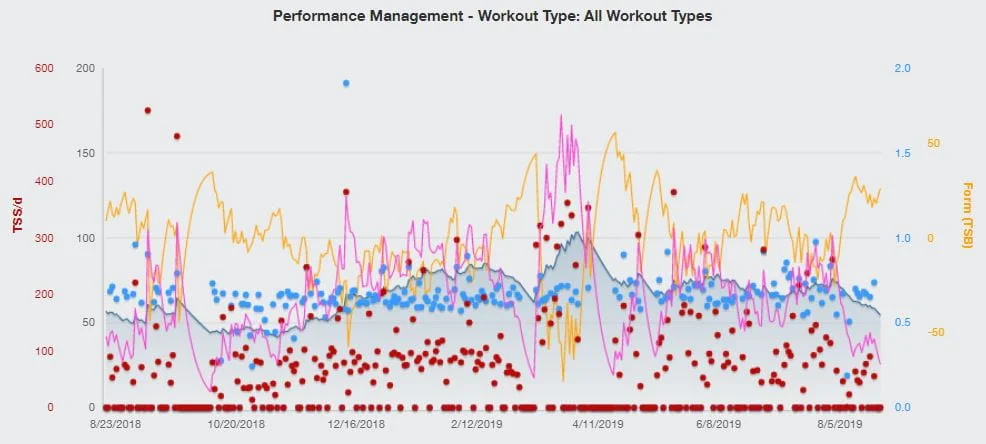How much should I train for cycling or triathlon races?
This is one of the top questions when a new athlete starts training, or one wants to improve his/her performance. How much should I train for a specific event? How many kilometers should I ride, how many kilometers should I run or swim? How many training hours should I do? Actually, that last question is the way to think about your training!
Everyone is looking for a silver bullet, but it doesn't exist! There is no answer for everyone, and it almost always is "it depends." Over my carrier, I have gotten people to win the races on 100-200 training hours a year. In other cases, an athlete can do up to 800 training hours, and he still doesn't win any races! There are many factors which impact your performance like your genetics, existing skillset, ability to train, level of racing, event difficulty.
“Everyone is looking for a silver bullet, but it doesn’t exist!”
Let's clarify the terminology - when we talk about training hours, we are measuring all your active training-related hours, that's when TrainingPeaks come in handy. We measure weekly and yearly hours, so we know how many hours per year you are doing. This includes your gym, core workouts, stretching, yoga, running, swimming, and handling skills lessons, etc. In another article, I will delve into Training Stress Score (TSS) and how this measurement helps us to track your training load and form.
Usually, we are asking our new and existing athletes - how many hours one is willing to train per week/year? The average traditionally comes to about 300 hours a year. From there, the coach starts planning according to athletes time availability. Keep in mind that with more training hours comes more training related stuff like more time washing your clothes, your bikes maintenance, eating, and most important - more recovery time. For example, if you add another training day, you also need more time for these things. A lot depends on your willingness and motivation - nothing is impossible!
“ A lot depends on your willingness and motivation - nothing is impossible!”
You can double your training amount, but you will have to change your life habits drastically. To be more realistic, our coaches are looking for about 5-20h of training per week, which would give us 250-1000h in a year. If there's an athlete who can currently train 250h, but 2-3 years ago he/she was doing around 500-600h, then a coach can safely increase yearly training amount. If you haven't done much more than 250h in previous years of training history, the coach will increase your annual training amount, just by about 10%. Of course, there are a lot of "moving parts," but it is at least a ballpark of what we are looking at. After adding more training hours, we are evaluating your performance and training adaptation over a year.
Besides the training amount, we need to look at how many months one is actually training. Quite a lot of athletes train 250-300 hours per year, but at the same time taking 2 - 3 months of total rest and sedentary lifestyle. If you think that you need time rest after a season where you had about 250h of training, you are probably wrong! You need to train instead of doing nothing during those months! To make this pretty simple and clear - you are not pushing your body so far that you would need to recover from those training hours for 2-3 months by doing nothing!
This notion of long offseason break came from cyclings pro peloton when guys were tweeting and posting on their social accounts that they are taking time off. True - they are not riding their bike, alright! But they most probably are still going on long hikes, running, hitting the gym, doing yoga and actually training but just in a different way. People tend to forget that!
“To make this pretty simple and clear - you are not pushing your body so far that you would need to recover from those training hours for 2-3 months by doing nothing! ”
On the contrary, if you are doing 250h for over 9 months, it makes a big difference. In this case, we have more options to increase your training capacity over a more prolonged period. In such a case, we could stretch ones annual hours up to 350h.
Don't forget about recovery we talked earlier - as a coach, I will always go for training consistency over the total amount of training. Doing a crash course of training is almost always a bad idea. If you keep consistency high, it will be more beneficial than doing crash course training.
The best athletes we have are the ones who are having quite a lot of "green" in their TrainingPeaks. It's hard to find missed workouts, and if you are not missing workouts, you always will be better. You should be training regularly and consistently. That's it!
That doesn't mean that you have to blindly follow a training prescription even if you're not feeling well. You need to talk to your coach weekly or daily to change your training plan on the go. This approach to planning and execution will give the best results at the end of the day.
AUTHOR,
JANIS MUSINS
TRAIN2WIN ENDURANCE COACHING HEAD COACH
Find out more about Train2Win Endurance Coaching











So it’s easy–you just do a bike fit and you’re all set up. Right?!
Not always.
I’ve been writing about the importance of saddle high and how much it could affect your performance. This time I will give an example how fast and how easy could be if you have popper tools and some basic (or just above) knowledge.